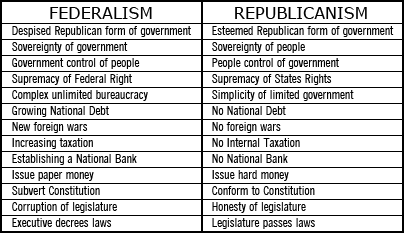Death of the Republic
In the tempestuous years of the American Revolution there were two giant steps that had to be taken by the Colonies through their representatives at the Continental Congress. The first step was to throw off the government of Britain which was accomplished through the signing of the Declaration of Independence, and the fighting of the Revolutionary War. The second step was to fill the vacuum of government which the first step created.
The first attempt to establish a national government was through the adoption of the Articles of Confederation which were inadequate and a second attempt was made with the ratification of the Constitution for the United States of America. Contained in the Preamble of this Constitution is the clear concise statement of the purpose of the creation of this national government. “We, the people of the United States, in order to form a more perfect union, establish justice, insure domestic tranquility, provide for the common defense, promote the general welfare, and secure the blessings of liberty to ourselves and our posterity, do ordain and establish this Constitution for the United States of America.” However, before many of the states would ratify the Constitution, they demanded that a declaration of rights of the people be set forth in that same Constitution. This declaration of rights was attached as an appendix to the Constitution and became known as the Bill of Rights. These were the Ten Commandments that government could not violate, if it did, then the Constitution would be abrogated and the union automatically dissolved.
During this time there were two views of government expressed and followed by the early administrations. One was the Federalist view whose advocate was Alexander Hamilton; the other was the Republican view whose leading spokesman was Thomas Jefferson. The principles of these two forces were in direct opposition to each other. The Federalist's position was the old monarchal principle of a strong central government, while the Republican's position was the new principle of the sovereignty of the colonies – THE STATES.
The Federalists made great advances under Washington's and Adam's administrations with the appointment of Alexander Hamilton (a Jew) as the Secretary of the Treasury. Jefferson's grounds of opposition to the Secretary of the Treasury were that Hamilton despised the Republican form of government, was a monarchist in theory, sought by administrative means to subvert the Constitution, and gradually convert it into something like that of Great Britain under George the Third. Being the Secretary of the Treasury Hamilton was able to contrive financial measures aimed at accumulating new powers in the hands of the Central Government. A part of this plan involved bribery of the legislature, that the votes by which it was in great part carried were recorded by a corrupt squadron of Representatives and Senators interested in public debt and bank scrip. In the ANAS Jefferson described Hamilton as “so bewitched and perverted by the British example as to be under thorough conviction that corruption was essential to the government of a nation.”
Madison had been associated with Hamilton when the United States Constitution was drawn up, but soon after that came a separation between the two. Madison in his old age said to his friend, Nicholas P. Trist: “I deserted Colonel Hamilton, or rather Colonel Hamilton deserted me - in a word, the divergence between us took place from his wishing to administration, or rather to administer the Government, into what he thought it ought to be; while, on my part, I endeavored to make it conform to the Constitution as understood by the Convention that produced and recommended it, and particularly by the States’ conventions that adopted it.” Since strong central government was the theme of the Federalists, it was necessary that the government always be expanding and growing. This would require ever increasing funds, and the Federalists knew that the populace would not bear the heavy burden of taxation unless they were made to think that it would only continue for a short time. The people would only agree to this temporary tax burden in order (1) to pay off the national debt, or (2) to support the national defenses in a time of war. Therefore, either the Federalists were increasing the national debt through deficit spending, or they were making preparation to involve America in a new foreign war.
The beginnings of the 1800's saw the defeat of the Federalists in the legislative and executive branches of government with the election of Thomas Jefferson as President. The Federalists had entrenched themselves in the judicial branch of government for life and thereby dominated the Federal Courts. In spite of this the Republicans began to reorganize the national government. In Jefferson's inauguration speech on March 4, 1801 the theme of Republicanism was simply and yet profoundly expressed. “With all these blessings, what more is necessary to make us a happy and prosperous people? Still one thing more, fellow-citizens, a wise and frugal government, which shall not take from the mouth of labour the bread it has earned.” In December 1801 Jefferson sent a message to Congress which again clearly set forth the aims of Republicanism. “Considering the general tendency to multiply offices and dependencies and to increase the ultimate term of burden which the citizens can bear, it behooves us to avail ourselves of every occasion which presents itself for taking off the surcharge (internal taxation), that it never may be seen here that after leaving to labour the smallest portion of its earnings on which it can subsist, government shall itself consume the residue of what it was instituted to guard.”
“A wise and frugal government” was Jefferson's main goal and for the first time the job of balancing the budget and paying off the national debt was undertaken, and Gallatine was appointed Secretary of Treasury with this awesome responsibility. Gallatine was so skillful in the accomplishment of this task that even though (go to top)
in 1803 customs produced $2 million less than in 1802, yet $15 million was provided for the Louisiana purchase, and all the needs of government were taken care of with an added $7 hundred thousand expenditure, the national debt began to be paid off, and all this was done without imposing a new tax. Republicanism was simplicity and economy in government.
Not only did Jeffersonian Republicanism aim at paying off the national debt, but also its goal was to keep America out of foreign wars. Neutrality was the watchword. President Jefferson wrote foreign ambassador William Short that America must stay out of European politics: “to be entangled with them would be a much greater evil than a temporary acquiescence in the false principles which have prevailed. Peace is our most important interest and a recovery from debt.” Jefferson knew through experience that war meant (1) conscription of life, (2) conscription of wealth, (3) public bankruptcy, and (4) confiscation of private property by taxation or debasement of money. War was contrary to all moral and economic interest of civilization, and therefore contrary to the principles of Republicanism.
Debasement of money was a problem that had plagued the colonies for the last 30 years. The people had experienced a series of depressions with inflation of prices brought on by the increased issuance of paper script. It was Thomas Jefferson who brought forth a sound money plan which was a complete break with the English system. Jefferson concluded that in order to avoid depressions caused by debasement of money, American money had to be hard money not worthless paper. This is expressed in the United States Constitution in Article 1 Section 8 which says, “The Congress shall have power to coin money, and to provide for the punishment of counterfeiting the current coin of the United States.” Article 1 Section 10 even limits the power of the states in the matter of money by saying, “No state shall coin money; emit bills of credit; make anything but gold and silver coin a tender in payment of debts.” Only by loose Federalist perversion of the Constitution could its clear wording be twisted to imply that the privately owned Federal Reserve Bank could print paper scrip and call it money. Its notes are not lawful money nor are they redeemable for lawful money. The Federalists tried to set up a National Bank (like the Federal Reserve) in 1790. Hamilton drew up the plan for the National Bank which Jefferson immediately opposed. Mr. Jefferson charged that “a system had been devised at the Treasury, and a series of laws passed, under which the states were being deluged with paper money instead of gold and silver. The poison had been injected into the veins of government; and the Constitution was being changed into a very different thing from what the people thought they had submitted to. There had now been brought forward a proposition far beyond any ever yet advanced, on the decision of which would depend, whether we live under a limited or an unlimited government.”
Not only were these Republican principles firmly established during Jefferson's 8 years as president, but also during the 16 years of the following administrations of Madison and Monroe. Federalism was supposed to have died during this period, but instead it only withdrew into its stronghold of the judiciary. Eternal vigilance for the Republic was soon replaced by perpetual indolence and indifference and the American Republic died. This event transpired so slowly that it came without public observation. Through the process of time and the unceasing efforts of the judiciary, the cancerous Federalism consumed the host of healthy Republicanism. The American public was not aware of what was happening to its government. The Federal judges determined the success or failures of the lawyers who practiced in their courts, and only those lawyers who were patrons of Federalism were allowed to wax rich. These wealthy Federalist lackey-lawyers were then able to gain key positions in government through the power of their money. Today the judiciary controls both the executive and legislative branches of government. In order to verify this fact find out how many positions in these branches of government are currently held by lawyers?
The Federalist’s judiciary through its Courts, Judges, and Servants of the Courts, Lawyers, has established a Federalist government in America. Compare the principles of Federalism with those of Republicanism and you will know beyond doubt that even though there is a Republican Party in name, the Republic is DEAD.
DIFFERENCE IN PRINCIPLES

Even the most naive can readily see that today’s government is not based upon Republicanism, but is totally on Federalism. However, this is not the time to mourn the death of the Republic, but rather to rejoice in the coming death of Federalism. When the cup of Federalistic abuses overflows and can be contained no more, then the national public will arise from its perpetual sleep of death and throw off this alien JEW bondage of Federalism. With this will come a completely new age and a glorious government, YAHWAH God's Kingdom in earth, “NOVUS ORDO SECLORUM”, the NEW ORDER OF THE AGES.








